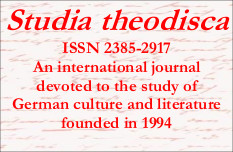Stefan Zweig’s Narratives of Migration and Emigration
DOI:
https://doi.org/10.54103/1593-2478/21674Abstract
Stefan Zweig’s relation to the phenomenon of migration is indeed a complicated issue, which can be approached from at least three perspectives. Firstly, there is the biographic aspect: as one of the major representatives of the German exile literature (Exilliteratur), Zweig has one of the most dramatic biographies among the German authors in the 20th century, including his emigration from Austria to England and New York, then to South America, where (in Petrópolis near Rio de Janeiro) he died in February 1942. Secondly, migration is present in his fictional works, such as the short stories Schachnovelle or Incident on Lake Geneva. Thirdly, Zweig published, a year before his death, his book Brazil, Land of the Future, which, lacking fictitious elements, but including biographic ones, basically summarizes the history (also immigration-history) of Brazil and the main cultural features of his host country. Accordingly, the following paper is a brief analysis of three possible dimensions of migration in Stefan Zweig: biographic migration, including his voluntary and, later, his forced migration, finally fictional migration, i.e. migration as a subject of his works.
Downloads
Published
How to Cite
Issue
Section
License
Copyright (c) 2023 Studia theodisca

This work is licensed under a Creative Commons Attribution-ShareAlike 4.0 International License.







